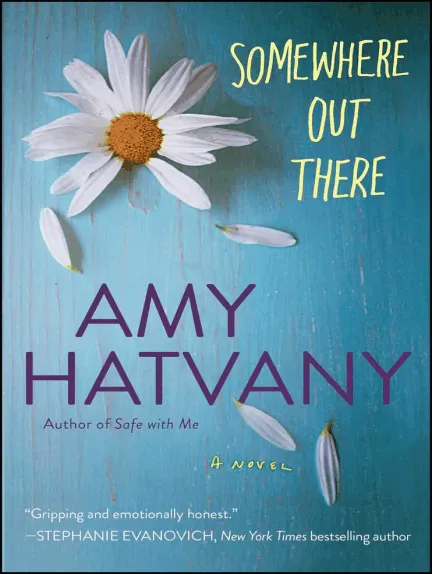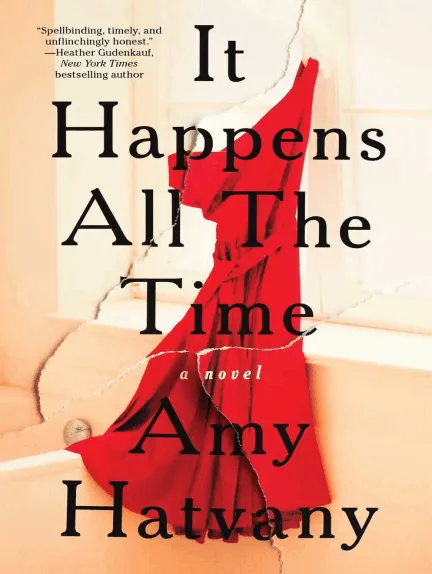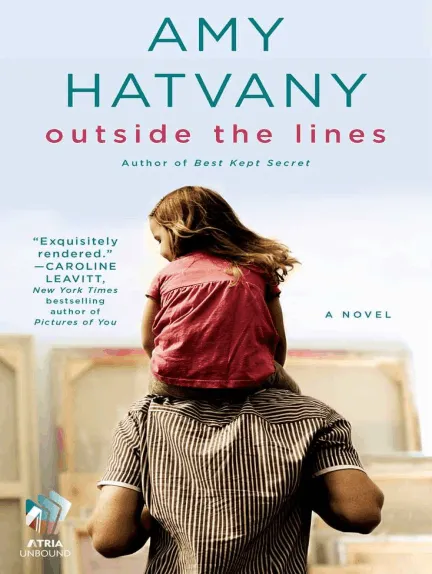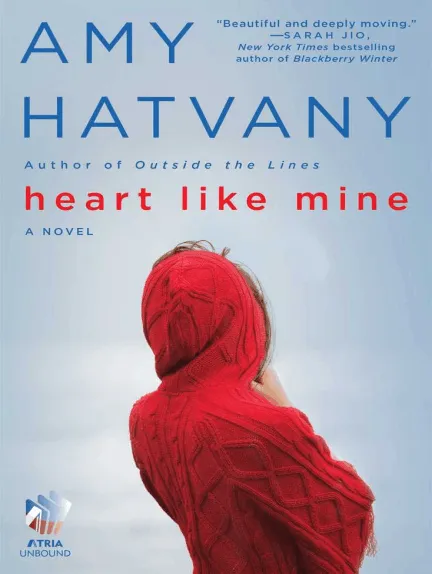The first thing Hannah hears is Emily’s soul-piercing scream. Next, the grinding screech of brakes and the sharp crunch as metals collide. The sounds twirl toward her in slow motion—still-frame, auditory blips. But then, in an instant, they stitch together into an image. Into a truth that steals her breath.
Oh, holy god.
She shoves back from her desk and races down the stairway, stumbling out the door and into the yard. With a wild-eyed gaze she sees it: the car she heard—a red convertible Mustang, top down, the engine still running. In front of it lies her daughter’s purple, glittering ten-speed. The handlebars are twisted and broken, the black tires torn right off the wheels. Someone screams and it takes a moment for Hannah to realize that it is her. The sound slices up through her throat like a spinning blade as she runs over to Emily, whose small body was flung from the crash. Her twelve-year-old daughter is splayed upon the blacktop, arms and legs turned at strange angles from her torso. Blood trickles down her forehead from an injury on her scalp. Her mouth is open, her eyes closed.
She wasn’t wearing her helmet. Oh god oh god oh god.
“Call 911!” Hannah shrieks. “Somebody, please, call them!” She is vaguely aware that her neighbors have rushed from their houses, too.
“I didn’t see her!” a woman cries. She is standing next to the car, hands clutching the sides of her blond head. “She shot out from the driveway! I didn’t have time to stop!” The woman is hysterical . . . sobbing, but Hannah doesn’t care. She drops down next to Emily, scraping her knuckles raw as she lifts her daughter from the rough pavement, gathering her child to her chest the way she did when Emily was still a baby, their hearts pressed together in sweet, synchronized beats.
“Mama’s here,” Hannah says, her mouth against her daughter’s dark, damp hair. “Don’t you worry. Mama’s right here.” Emily is limp, unmoving.
A small gathering of people creates a protective circle around them both. It is a hot, sunny Saturday in late July. A day for barbecues and picnics, for Popsicles and campfires and s’mores. This can’t be happening. It can’t be. She’s all I have. Nothing else matters. Just her.
Their next-door neighbor, Mr. Blake, sinks to his knees beside Hannah and slips an arm around her. “The ambulance is coming,” he says. “Maybe you shouldn’t move her.”
Hannah ignores him. “She’s going to be okay,” she murmurs. “She has to be.” She clutches Emily tighter.
After a few minutes that feel more like hours, like decades, a siren whines in the distance, growing louder as it draws close. It isn’t fast enough. Mr. Blake places two of his gnarled fingers on Emily’s throat, and Hannah’s first instinct is to yank her away, to protect her daughter from any more possible harm, but then she realizes what he’s trying to do.
“She has a pulse,” he says. “It’s weak, but it’s there.”
Hannah nods, her lips pressed together so hard she can’t feel them. She can’t feel anything. The inside of her skull is a beehive someone just kicked. She can’t form a thought. There is only the buzzing . . . the one word in her head, one incantation, one prayer.
She closes her eyes and whispers the word please.
• • •
Hannah waits. She sits in the emergency room, gripping the edge of her chair, her arms stiff and straight, her body rocking forward and back in small, measured movements. The space bustles with a state of urgency: nurses in brightly patterned smocks and sensible white shoes jog down the hallways; an aide rushes past with an empty gurney. The air, thick with antiseptic and sweat, tickles the back of Hannah’s throat; she’s afraid she might vomit. Patients cry out, phones ring, doctors are paged stat to the OR—sound effects like fishhooks in her skin.
She throws a quick glance at the people in the seats around her—a man with deeply lined skin and a thatch of white hair sits alone, holding a straw hat in his lap, tearing at its brim with shaking fingers. One of his legs bounces in a staccato rhythm; his plaid shorts expose thickly veined, knobby knees. For some reason this feels obscene to Hannah, almost as bad as if he had flashed her. Across the room, a couple hold each other’s hands. Tears run down the woman’s pale cheeks and she gives Hannah a look filled with palpable, aching empathy. Hannah bobs her head once, holding the woman’s gaze for a moment, but then drops her eyes to the cold, glossy floor. It’s too much for her, this kind of agony laid bare. Too raw and bloody. Too real.
The doctors are attempting to save Emily’s life. They hurried her into surgery just moments after the medics rushed her inside the hospital. In a hazy fog, she signed all the forms the nurses put in front of her, giving the doctors permission to do their work.
“Please,” Hannah said to the doctor hovering over Emily before they wheeled her away. “Help her.” Emily’s hair stood out like a swath of dark ink against the white sheet beneath her. Her skin was pasty except for the blackening blood on her face. She still hadn’t moved.
“We’ll do everything we can,” the doctor said, giving her arm a quick squeeze before whisking her only child through gray double doors.
Now, two hours later, a nurse approaches Hannah in the waiting room. “Can I get you anything?” she asks. “Do you need to call anyone?”
Hannah shakes her head. Not yet. She’ll phone her parents once she knows more about Emily’s condition. When she can tell them their granddaughter will be okay. Mr. Blake had offered to come with her as she climbed into the back of the ambulance, but she told him no.
Thirteen years ago, at thirty-one, Hannah signed up for motherhood knowing full well she’d be on her own. She wanted a child so much that she was no longer willing to wait for the right man to come along, given the odds of finding someone who, unlike Devin, her fiancé for two years in her late twenties, didn’t screw around behind her back.
Instead, she opted for a sure thing: sperm donor number 4873, a twenty-three-year-old premed student with dark hair and a family history vacant of serious illness. “Look at me,” she joked to her best friend and business partner, Sophie. “I’m a cougar.” Nine months after the procedure, Hannah held a red-faced, squalling baby Emily in her arms.
As she waits, Hannah’s thoughts wander to all of those early nights she and Emily spent together—nights when Emily wouldn’t sleep, when the only thing that brought her baby comfort was pacing the house for hours at a time.
“You are the reason I’m here,” Hannah whispered into Emily’s tiny, seashell-shaped ear. “You’re my angel . . . my sweet, perfect girl.” Emily gazed back at her with round-as-poker-chips blue eyes, and Hannah couldn’t help but believe that, even as an infant, her daughter understood her, that the love she felt for Emily was a language only the two of them could speak.
She had support, of course. Sophie took over the bulk of the salon’s administrative work for a couple of years right after Emily was born, and Hannah worked solely as a stylist. Jill, the nanny she hired when Emily was four months old, cared for her daughter while Hannah expertly cut and colored her clients’ hair. While her parents were in Boise, too far away to be of much immediate help, they flew into Seattle at least once a year, and Hannah took Emily to their farm for almost every major holiday. There was nothing sweeter than seeing Emily at two years old chasing after the chickens that had free range of her parents’ front yard, nothing that filled Hannah’s heart more than her almost-teenage daughter still climbing up into Grandpa’s lap for a cuddle.
They’d visited the farm just a few weeks ago, over the Fourth of July weekend, enjoying an enormous meal of her mother’s crispy fried chicken and creamy dill potato salad, in which the celery absolutely counted as a serving of vegetables, her father insisted as he scraped the bowl clean. Emily was basking in her grandparents’ attention, relishing her role as their only grandchild, but also missing her uncle Isaac. “Why didn’t he come?” she asked as she stood on the edge of the wraparound porch, tilting her dark head and placing a splayed hand on her jutted-out hip. “He’s supposed to light the fireworks.”
“He really wanted to, honey, but he couldn’t get out of a business trip,” Hannah said. Almost twenty-five years ago, her brother had moved to Seattle because he’d received a full-ride structural engineering scholarship to the University of Washington. A year and a half later, Hannah followed him to the city in order to attend cosmetology school; her parents agreed to her moving away from Boise, too, only because her big brother would be close by. Hannah resented this a little at the time—what eighteen-year-old girl wants her big brother watching her every move? But later, especially after Emily was born, Hannah was grateful to have him around. Isaac was a doting uncle, devoted to Emily at least as much as her grandparents. He was certainly a positive male influence in her life—he taught her to ride her bike and fixed the broken toys Hannah would have thrown out. He played tag and roughhoused with Emily in the silly way that men like to do. His job demanded that he travel far too much to find a relationship that lasted longer than a few months, let alone become serious enough to consider having children, so he channeled all his paternal emotions into his niece. He took good care of them both.
A scowl took over Emily’s face as she took a moment to consider Hannah’s explanation for her uncle’s absence. “That stinks,” she finally remarked, then trotted off to pet one of the horses over the fence. She adored Isaac as much as he adored her.
“She’s so much like you,” Hannah’s mother said, after watching this brief exchange.
With her long black hair and narrow face, Emily certainly looked like Hannah, but Hannah didn’t think her mother was referring to their appearance. “Like me how?” she asked.
“She’s a thinker.” Her mother reached over and gave Hannah a knowing look. “But not afraid to speak her mind.”
Hannah couldn’t help but believe that her mother was right. Emily had been such a good baby, calm and serious, always seeming to absorb the world around her like a thirsty sponge, observing people’s behavior, every detail. Cataloging them somehow. Deciding who was worthy of her attention and who was not. When Emily was a toddler, her belly laugh was infrequent enough that Hannah felt a true sense of accomplishment whenever she managed to evoke it. Emily wasn’t withdrawn. Just . . . contemplative. She knew her own mind from an early age, stubbornly insisting on picking out her own outfits and meals, asserting her individuality wherever she could. Power struggles arose from time to time, with Emily’s helmet being one of them. Hannah insisted that she wear it anytime she straddled her bicycle; Emily reasoned that if she was only riding on the sidewalk in front of their house, she shouldn’t have to. “The cement on the sidewalk will crack your skull just as easily as in the street,” Hannah told her more than once.
Hannah shudders now, thinking back to the many times she spoke those seemingly prophetic words. Why did Emily ride into the street when she knew Hannah strictly forbade it? Was she angry that Hannah said she had to come to the salon that afternoon because Jill was sick and couldn’t come to the house? Was this simply a quiet act of rebellion that ended in disaster? What if Hannah had canceled her appointments for the day and instead spent the time with Emily? What if Emily had chosen to watch TV instead of slipping out the side door to the garage and climbing onto her bike? What if she hadn’t zipped out of the driveway into the car’s path? What if, what if?
Hannah closes her eyes and bites her bottom lip, trying to shut out the rampant noises around her. Nausea roils in her stomach and sour bile rises in the back of her mouth. She focuses on her daughter, imploring a God she isn’t sure is there. Please.
Her phone vibrates in her purse, and she grabs for it. “Hannah?” Sophie’s familiar voice, lilting with the soft trill of her French accent. After her parents’ divorce when she was fourteen, Sophie and her mother immigrated to the United States to live with relatives, and while both spoke impeccable English, Sophie’s words still sound as though they were made of music. “You missed your three o’clock color with Mrs. Clark. She was furious, chérie. Where are you?”
Hannah’s chin trembles and her breath rattles inside her chest. “I’m at Swedish hospital. Emily’s in surgery.”
“What? Oh my god. What happened?”
Hannah tells Sophie about the red convertible, about Emily’s mangled bike. “She wasn’t wearing a helmet. I’ve told her a million times to put that damn thing on no matter what. No matter how hot it is or how itchy. Why didn’t she listen to me?” Hannah’s sobs tear at her throat as she speaks. “Oh god, Sophie. I’m so scared.”
“I’ll be right there.”
“You don’t have to—” Hannah starts, but Sophie has already hung up. Much of their salon’s success was due her partner’s unwillingness to take no for an answer. It was the reason Hannah owned half the business in the first place.
Almost twenty years ago, she and Sophie worked together at a large commercial salon where it was less about the quality of their work and more about how many clients they could shuffle in and out of their chairs each day. Finally, after a few years of dealing with a toxic atmosphere of gossipy and backstabbing stylists, Sophie talked Hannah into applying for a small business loan to start their own salon. They were so successful, in fact, that they had recently purchased a charming Craftsman house in a business district of Bellevue and planned to transform it into a second Ciseaux location.
“Ms. Scott?” A doctor in blue scrubs approaches, snapping Hannah out of her thoughts. He is older, a fact she finds strangely comforting, as though his years of wisdom and experience can somehow erase the perilous nature of this moment. His silver hair is damp around his forehead, and he clutches a surgical cap in one hand. “I’m Dr. Wilder. I was working on your daughter.”
Was? Hannah stands, pulse racing, still clutching her cell phone. “Is she okay? Can I see her?”
“Soon.” Dr. Wilder takes another step toward her and gestures for her to sit. She complies, slipping her phone back into her purse, which she has only because another neighbor dashed into her house and grabbed it for her before the ambulance shut its doors. The doctor sits as well, taking her hand in his. His fingers are soft and warm. They feel capable. Hannah latches on to this thought as evidence that Emily is safe.
“Your daughter sustained life-threatening injuries,” he says. His voice is low and calm; his gray eyes reveal nothing. “When her head hit the pavement, her brain began to bleed.” Hannah nods, her jaw rattling so violently she has to clench her teeth to stop it. Dr. Wilder knits his thick, white brows together before continuing. “We were able to stop the hemorrhage, but I’m afraid the damage was extensive.”
“What does that mean?” Hannah asks. Her heart thuds against her rib cage in a violent rhythm, hard enough to convince her it will bruise.
“It means she is alive, but only because we’ve put her on a ventilator.” He waits a beat. “She’s had no spontaneous brain function. None at all since she came in.”
The buzzing in Hannah’s head takes over her thoughts and the room starts to spin. She closes her eyes. “Is it a coma?” she finally manages to whisper. “Will she wake up?”
Dr. Wilder squeezes her hand. “I’m afraid not,” he says. “There’s no activity in her brain stem. If we discontinued life support, she wouldn’t survive. I’m so sorry to have to tell you this, but there’s simply no chance she’ll recover.”
Her eyes snap open. “Oh god . . . no!” She moans, a low, throbbing sound. Letting go of his hand, she bends at the waist, crossing her arms over her chest. Tears rush down her cheeks as she once again rocks in place. “Are you sure? Are you sure?” she repeats. She feels the eyes of the couple across the room upon her. The old man gets up and walks away, as though distancing himself from her could help him avoid a similar fate.
“Yes,” the doctor says. “I’m very sorry.” He doesn’t speak again, waiting for Hannah to right herself.
When she does, she faces him with swollen eyes and red cheeks. “She should have worn that damn helmet,” she says through quivering lips.
“Wouldn’t have made a difference,” he says. “The impact was too severe.”
Hearing this, Hannah allows herself to feel a small flash of relief. “Isn’t there something else you can do? Another surgery?” she asks, but Dr. Wilder frowns and shakes his head. Hannah feels her throat close up. She can’t swallow, and for a moment, she can’t speak. The walls seem to curve, compressing the air around her. She reminds herself to breathe. “I need to see her,” she finally says in a hoarse voice, one she doesn’t recognize as her own. Her body feels fragile, like thinly blown glass.
Dr. Wilder nods. “Of course,” he says, then hesitates a moment before continuing. “And please, forgive me, but I need to ask . . . is your daughter an organ donor?”
“What?” Hannah says, blinking. She can’t focus on his meaning. She knows she should understand it, but everything is muffled, as though they were having this conversation underwater.
“If she’s a donor, it’s possible she can save other lives when she passes.”
When she passes? Hannah can’t wrap her mind around the thought. I’ll do anything, anything to make this not true. I’ll sell the business, move back to Idaho with my parents like they’ve always wanted. I’ll give Emily a quiet life in the country, let her frolic with goats and milk the cows, like I did growing up. I’ve been so selfish, having her live in the city. I’ll give everything up. I’ll change it all if she’ll just stay with me.
Hannah shakes her head. “I just . . . I don’t . . . I can’t think about that right now,” she says.
“I understand how difficult this is,” the doctor says. “I only ask because her organs will deteriorate as her condition worsens. The sooner we know if she might be a donor, the more lives she could save. That’s all.” He stands and motions for her to do the same.
Hannah stares at him a moment, wondering if she refuses to go, if she cements herself to the chair, would anything change? If she could somehow reverse the day, go back to the beginning and start over, do everything differently, none of this would have happened.
But the look Dr. Wilder gives her lifts her from her seat. With a deep breath, she follows him down the hall, suddenly facing the kind of decision that no mother should ever have to make.




















